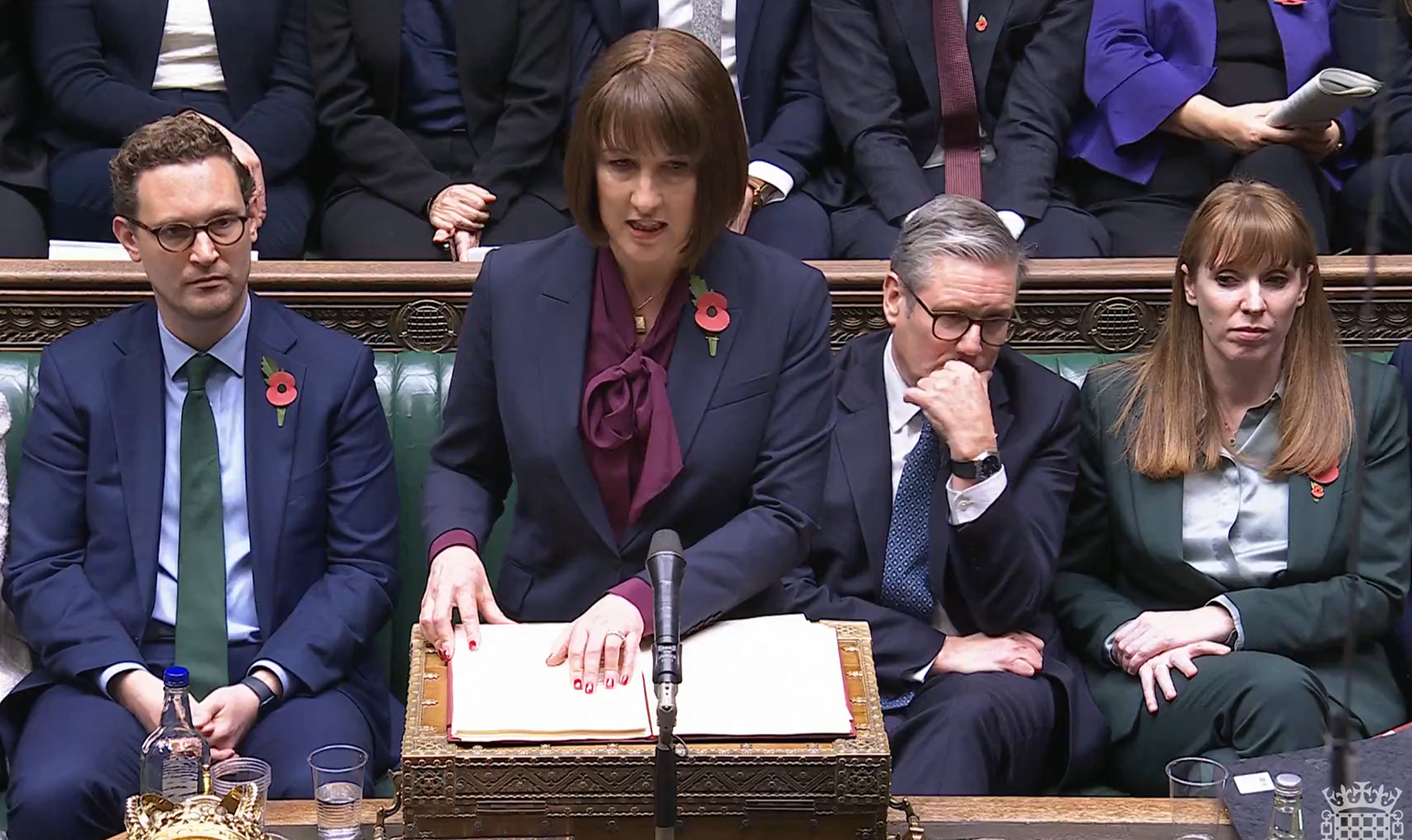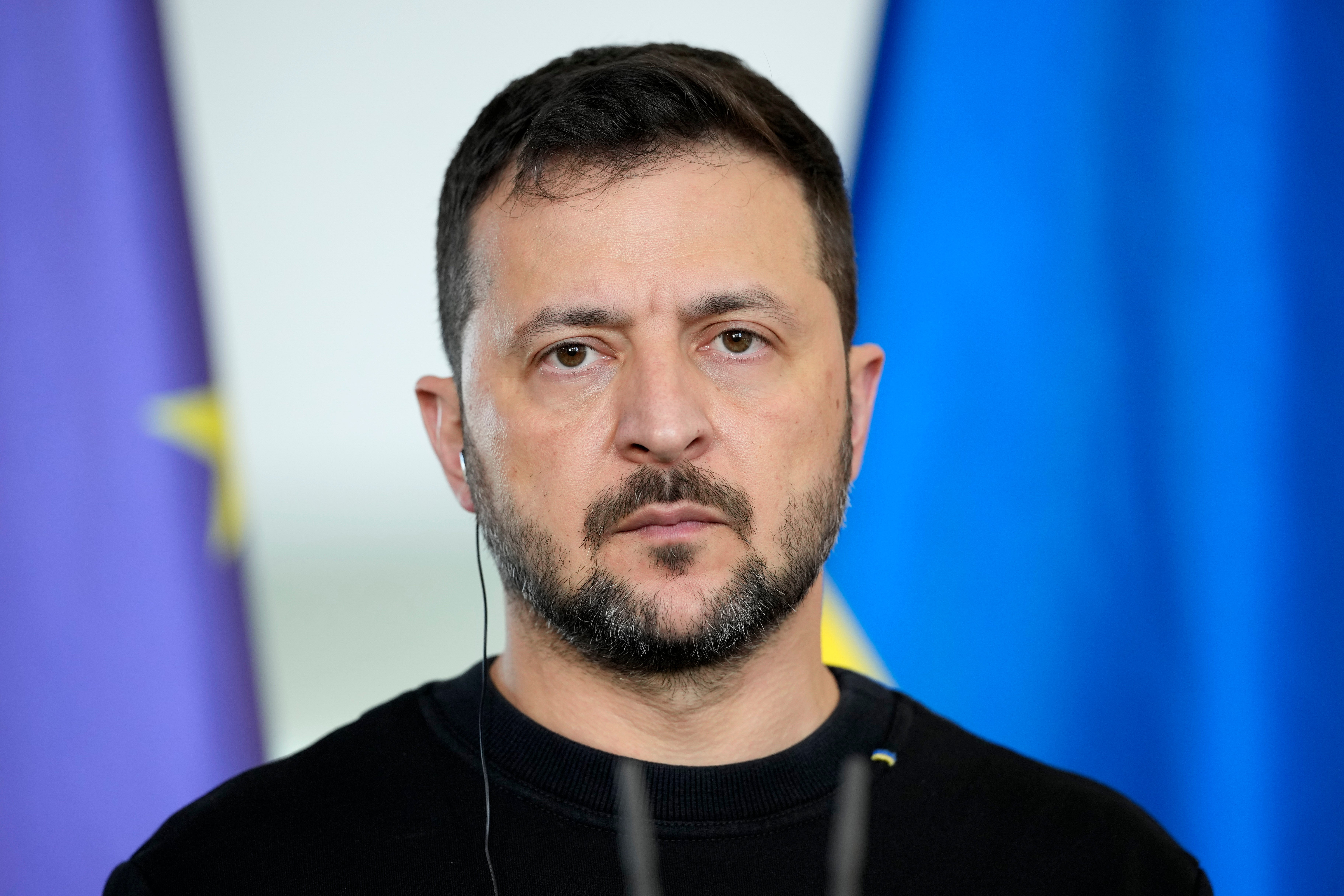Ukraine-Russia war live: North Korean troops deployed to frontline will ‘surely return in body bags’, US says
Number of North Korean soldiers inside Ukraine set to grow, Western intelligence official adds
Your support helps us to tell the story
This election is still a dead heat, according to most polls. In a fight with such wafer-thin margins, we need reporters on the ground talking to the people Trump and Harris are courting. Your support allows us to keep sending journalists to the story.
The Independent is trusted by 27 million Americans from across the entire political spectrum every month. Unlike many other quality news outlets, we choose not to lock you out of our reporting and analysis with paywalls. But quality journalism must still be paid for.
Help us keep bring these critical stories to light. Your support makes all the difference.
The US and South Korea have called on North Korea to withdraw its troops from Russia that are reportedly already inside Ukraine.
“Should DPRK’s troops enter Ukraine in support of Russia, they will surely return in body bags. So I would advise Chairman Kim to think twice about engaging in such reckless and dangerous behaviour,” Robert Wood, US envoy to the UN, said.
South Korea and its allies have claimed that North Korea has sent at least 11,000 soldiers to Russia, with more than 3,000 of them now deployed close to the frontlines in Ukraine, a presidential official in Seoul said on Wednesday.
The US said some of the North Korean soldiers were in Kursk, a border region where the Russian forces have been fighting off a Ukrainian incursion since August. A couple of thousand more were heading there, the Pentagon said.
This came as Ukraine drafted 160,000 more people in anticipation of grinding warfare and a frozen battle zone in the upcoming winter, the third such under Russian invasion.
EU says Georgia must change course before EU membership talks can begin
The European Commission on Wednesday told Georgia that it will not be able to recommend opening European Union membership talks with the country unless it changes course, while praising Ukraine and Moldova’s efforts to implement reforms in a challenging environment.
Georgia's governing party, seen by many western governments as increasingly Moscow-friendly, won a parliamentary election on Saturday that was marred by reports of voting violations, as Moldova prepares for a presidential runoff election on Sunday that pits a pro-Western incumbent against a candidate backed by a traditionally pro-Russian party.
In an annual report on the bloc’s enlargement policy, the Commission reiterated that Georgia’s accession process has de facto been halted due to factors such as legislation that requires organisations receiving more than 20 per cent of their funding from abroad to register as agents of foreign influence and "strong anti-EU narratives."
Pointing to international observers’ reports of voter intimidation and procedural inconsistencies in Georgia’s election, the Commission said there is a need for electoral reform and that "constructive and inclusive dialogue across the political spectrum is now paramount".
"The EU remains committed to further deepen the partnership," the report said, warning that "unless Georgia reverts the current course of action the Commission will not be in a position to consider recommending opening negotiations with Georgia."
The report pointed to progress in Ukraine and Moldova, which began accession talks with the EU earlier this year, noting however that more work needs to be done.
"Despite progress on fundamental reforms, further efforts are needed," the Commission said, regarding Ukraine's process.
In Moldova, the Commission said additional efforts are necessary to implement a 'deoligarchisation' plan.
The Commission said it is "looking forward to the opening of negotiations on clusters, starting with the fundamentals, as soon as possible in 2025" for both countries if conditions are met.
Russian-led CSTO military bloc to hold drills in Belarus in Sept 2025, Belarus says
The Collective Security Treaty Organisation, a Russian-led post-Soviet military bloc, plans to hold exercises in Belarus in September 2025, the Belarusian Defence Ministry said on Wednesday.
Prosecutors seek a 17-year prison term for Pentagon secrets leaker Jack Teixeira
Prosecutors plan to argue that a Massachusetts Air National Guard member who pleaded guilty to leaking highly classified military documents about the war in Ukraine should serve nearly 17 years in prison.
In a sentencing memorandum filed Tuesday, prosecutors said Jack Teixeira "perpetrated one of the most significant and consequential violations of the Espionage Act in American history”.
"As both a member of the United States Armed Forces and a clearance holder, the defendant took an oath to defend the United States and to protect its secrets — secrets that are vital to US national security and the physical safety of Americans serving overseas," prosecutors wrote. "Teixeira violated his oath, almost every day, for over a year."
Teixeira's attorneys will argue that US District Judge Indira Talwani should sentence him to 11 years in prison. He is scheduled to be sentenced 12 November.
In their sentencing memorandum, they acknowledged that their client "made a terrible decision which he repeated over 14 months."
"It's a crime that deserves serious consequences," the attorneys wrote. "Jack has thoroughly accepted responsibility for the wrongfulness of his actions and stands ready to accept whatever punishment must now be imposed."
Teixeira, of North Dighton, Massachusetts, pleaded guilty in March to six counts of the willful retention and transmission of national defense information under the Espionage Act nearly a year after he was arrested in the most consequential national security leak in years.
The 22-year-old admitted that he illegally collected some of the nation's most sensitive secrets and shared them with other users on the social media platform Discord.

Poland’s commission looking into Russian influences finds ex-defence minister at fault
The head of a special commission investigating Russian and Belarusian influences in Poland has said that it will refer to prosecutors a former defence minister whose decisions it said impaired Poland's defences ahead of Russia's 2022 war on Ukraine.
The commission was launched in May by the pro-European Union government of Prime Minister Donald Tusk to investigate cases of Russia and Belarus exerting influence on Poland's politics since 2004.
Tusk and other officials say Poland, a key ally of Ukraine, is facing intensified hybrid attacks from Russia and its neighbor and ally Belarus that include acts of sabotage, cyberattacks and growing migrant pressure along the Poland-Belarus border.
Poland's previous government was in the hands of the conservative Law and Justice party, which put Poland at odds with the EU, chiefly over changes to the country's justice system and rule-of-law principles. The current administration has been taking steps to hold officials of the previous government accountable for what it says are serious irregularities.
On Wednesday, Gen. Jaroslaw Stróżyk, head of the commission and the Military Counterintelligence Service, presented the first unclassified conclusions that saw some of the former government's decisions as potentially hurting Poland's interests.
He said that some of the documents the commission has reviewed suggest the existence of "direct influence" by Russia, without providing further details. He said many of the documents remain classified.
Stróżyk said that Antoni Macierewicz, defence minister in 2015-18, without any analysis or consultation, cancelled plans to purchase seven tanker aircraft for Poland's F-16 jet fighters, thus reducing their airborne time and defense capabilities.
The commission said the decision was dictated by Macierewicz's "personal aversion to partners in the EU" and called it a "diplomatic treason." Stróżyk said the commission will refer the former defence minister to prosecutors, who will decide whether to take further action.
The commission also blamed Macierewicz for hurting operations handled by Poland's special services and intelligence by closing 10 of their 15 regional bureaus in 2017.
Stróżyk said the commission found no signs that the previous government held any debates or took any pro-defence decisions in response to US warnings that Russia was preparing to attack neighboring Ukraine.
Macierewicz on Wednesday dismissed the report, calling it "absurd”.
Zelenskyy expects Ramstein meeting on Ukraine aid in coming weeks
Ukrainian President Volodymyr Zelenskyy has said the next meeting of the Ramstein group that coordinates military support for Ukraine should be held in the coming weeks.
Initially scheduled for October, the highest level meeting to date of the Ramstein group was postponed after US President Joe Biden cancelled his trip to Germany because of hurricane in his country.
"We are also already seeing the contours of the Ramstein meeting, which should take place in the coming weeks," Zelenskyy said in his evening address on Wednesday.

Ukraine has received only 10% of latest approved aid from US, Zelenskyy says
Ukraine has received only 10 per cent of US military aid approved by Congress earlier this year, President Volodymyr Zelenskyy said in a video released on Wednesday.
Russia, which sent tens of thousands of troops into Ukraine in February 2022, has accelerated its advances in the east and Kyiv's military is outgunned and outmanned by its more powerful foe.
Ukraine is also bracing for what could be the toughest winter of the war after long-range Russian airstrikes destroyed what officials say is about half of its power generating capacity.
"You do your job. You count on reserves, you count on special brigades, you count on such equipment. And if you get 10 per cent of all the package (that) has already been voted on... it's not funny," Zelenskyy said in remarks in English to Nordic journalists on Tuesday that were published in full on his Telegram page on Wednesday.
A $61 billion aid package from the United States, stalled by Republicans in Congress from December last year, was approved in April.
Zelenskiy added that the slow pace of weapons supplies was not a question of funding. "It’s always the question of bureaucracy or logistics, ideas or scepticism... This we will give you, this - will not," he said.
He also said that NATO countries had pledged to supply Ukraine with six or seven air defence systems, which Ukraine increasingly relies on to repel long-range Russian strikes, by the beginning of September but that Kyiv had not yet received all of them.
US cracks down on Russia sanctions evasion in fresh action
The United States has imposed curbs on hundreds of targets in fresh action against Russia, taking aim at sanctions circumvention in a signal that the US is committed to countering evasion.
The action, taken by the US Treasury and State departments, imposed sanctions on nearly 400 entities and individuals from over a dozen different countries, according to statements from the Treasury and State departments.
The action was the most concerted push so far against third country evasion, a State Department official told Reuters. It included sanctions on dozens of Chinese, Hong Kong and Indian companies, the most from those countries to be hit in one package so far, according to the official. Also hit with sanctions were targets in Russia, the United Arab Emirates, Turkey, Thailand, Malaysia, Switzerland and elsewhere.
The action comes as Washington has sought to curb Russia's evasion of the sanctions imposed after its 2022 invasion of Ukraine. The US has repeatedly warned against supplying Russia with Common High Priority Items - advanced components including microelectronics deemed by the US and European Union as likely to be used for Russia's war in Ukraine.
"This should send a serious message to both the governments and the private sectors of these countries that the US government is committed to countering the evasion of our sanctions against Russia and to continue putting pressure on Russia to end its war in Ukraine," the official, speaking on condition of anonymity, said.
The US Treasury Department imposed sanctions on 274 targets, while the State Department designated more than 120 and the Commerce Department added 40 companies and research institutions to a trade restriction list over their alleged support of the Russian military.
"The United States and our allies will continue to take decisive action across the globe to stop the flow of critical tools and technologies that Russia needs to wage its illegal and immoral war against Ukraine," Deputy Treasury Secretary Wally Adeyemo said in the statement.
UK’s chancellor pledges more cash for defence spending
The UK’s chancellor Rachel Reeves has pledged to provide the defence ministry with an additional £2.9billion next year and promised an annual £3billion support for Ukraine would continue for "as long as it takes".
In her first Budget speech presented on Wednesday, Ms Reeves said the extra spending would take Britain towards its goal of allocating 2.5 per cent of GDP towards defence, and ensure the country exceeded the NATO commitment of spending 2 per cent.
She added that the promise to maintain the annual military support to Ukraine came on top of a £2.26billion loan, part of the G7's Extraordinary Revenue Acceleration agreement announced last week, to aid the country in its war against Russia.

Zelenskyy strongly hints Ukraine seeking Tomahawk missiles from US
Ukrainian President Volodymyr Zelenskyy has strongly suggested that Kyiv has requested supplies of long-range US Tomahawk missiles, as he made critical remarks about "confidential" information he said had been leaked.
Tomahawk missiles have a range of 2,500 km (1,550 miles), far greater than any missile Ukraine currently has in its arsenal. Such a weapons delivery would almost certainly be seen by Russia as an escalation in its war in Ukraine.
Zelenskyy travelled to the United States last month to pitch a "victory plan" to President Joe Biden, which he said could help pressure Moscow to negotiate an end to the war in good faith.
The Ukrainian leader has since said the plan envisages a "non-nuclear deterrence package" that would only be used if Moscow does not end its full-scale invasion and continues to escalate the conflict.
Some of the plan's details have been kept confidential, something Zelenskyy alluded to in remarks in English to Nordic journalists on Tuesday that were published in full on his Telegram page on Wednesday.
The New York Times also cited a senior US official on Tuesday as saying that Zelenskyy had asked for Tomahawk missiles, something the official said was totally unfeasible.
Zelenskyy: Russia won in Georgia, ‘on its way’ to doing same in Moldova
Ukrainian President Volodymyr Zelenskyy has said the West should admit Russia has "won" in Georgia and is on its way to doing the same in Moldova unless Western rhetoric against crossing Moscow's red lines was dropped.
"We have to recognise in Georgia for today Russia won. First, they took part of Georgia, then they changed policy, the government. And now [Georgia] has a pro-Russian government," he said in English in a video released on Wednesday.
He added that Russia was "on the way" to doing the same in Moldova. "And they will do, if of course the West will not stop dialogue [against] crossing of red lines," Zelenskiy said.

Subscribe to Independent Premium to bookmark this article
Want to bookmark your favourite articles and stories to read or reference later? Start your Independent Premium subscription today.





Join our commenting forum
Join thought-provoking conversations, follow other Independent readers and see their replies
Comments